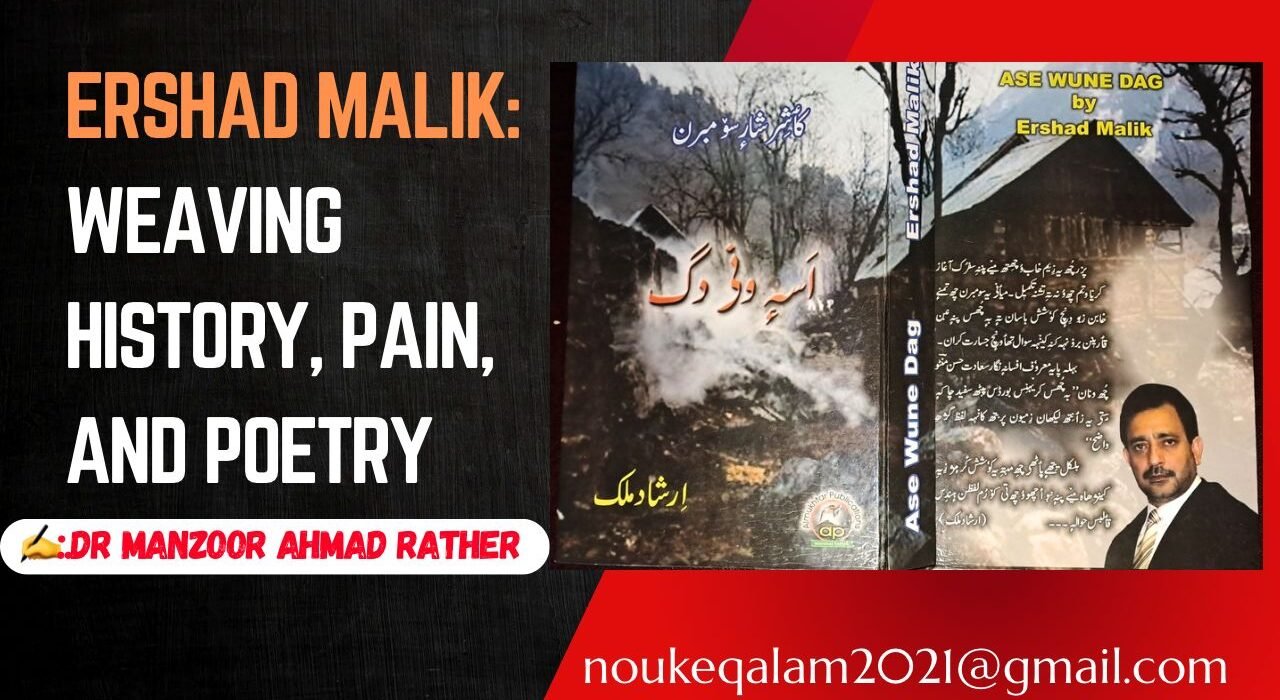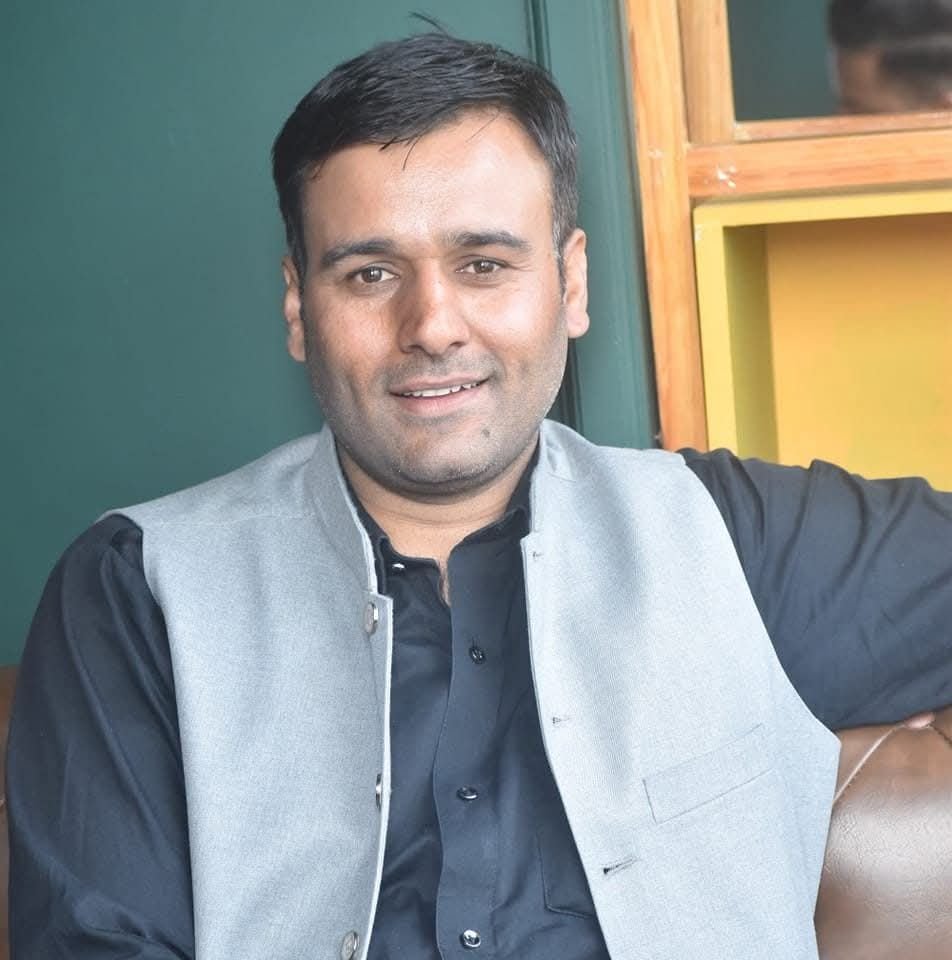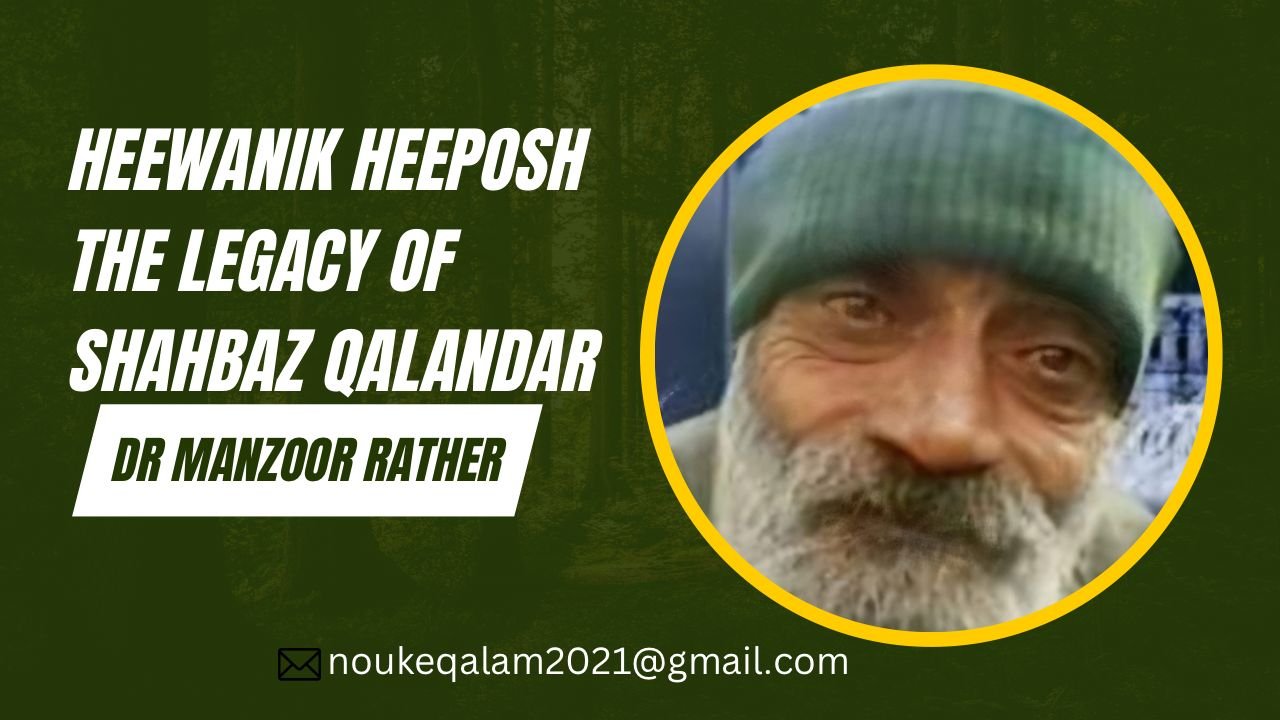Kashmir, a land known for its breathtaking landscapes and rich cultural heritage, has also been a place of conflict, displacement, and longing. In this turbulent backdrop, poetry emerges as both an expression of pain and an act of resistance. One such poet who has captured the raw emotions of Kashmir in his verses is Ershad Malik of Kitchama Narvaw Baramulla. His poetry collection, Asvin Dagg (Smiling Pain), is a literary reflection of the struggles, resilience, and unspoken sorrow of the Kashmiri people.
A Journey from Kitchama toLondon
Ershad Malik Born on May 3, 1962, in Kitchama, a village in the Narvaw Valley of Baramulla, Ershad Malik’s journey as a poet has been shaped by both his homeland and his experiences of migration. His ancestors, tracing their origins to Central Asia, settled in Narvaw, a land deeply intertwined with Kashmir’s rich literary and cultural traditions. Despite his professional career as a Solicitor Advocate, with an LLB from the University of Kashmir and a qualification of his QLTT from BPP University in London, his true passion has always been literature and poetry. Having spent 14 years in Muzaffarabad, Rawalpindi, and Islamabad, before settling in London in 2004, Ershad Malik’s poetry carries the essence of exile, displacement, and an enduring connection to his homeland. A. S. Dulat, former Research & Analysis Wing (R&AW) head in his book Kashmir in Vajpayee Years excerpts Ershad Malik as, Ershad has been a practising lawyer in Baramulla, was the organiser of the district bar association, and actually worked for the government, representing the local cooperative bank.
The Legacy of Asvin Dagg
The title, Asvin Dagg (Smiling Pain), is itself deeply symbolic. It conveys the contradiction of joy and suffering, a reflection of how Kashmiris endure their hardships with resilience. Ershad Malik’s poetry is deeply introspective, giving voice to the emotions that many in his homeland struggle to express.
His writing follows in the tradition of Kashmiri literary greats like Rasul Mir, Mehjoor, and Rehman Rahi, but it also carries influences from global literary giants such as Ghalib, Faiz, Wordsworth, and Shakespeare.
Published first in 2012 and again in 2015, Asvin Dagg is a collection of 147 poems that traverse themes of political turmoil, social struggles, and personal introspection. The foreword, written by prominent Kashmiri poet Mushtaq Kashmiri, describes Ershad Malik’s poetry as “teardrops from his eyes”, emphasizing the depth of pain woven into his words.
This collection gained significant recognition, leading to two book launches—one at The Chiltern Hotel, Luton, UK (2015), and the second at Sherwani Community Hall, Baramulla (2016).
One of the book’s most celebrated poems, Visa, was performed as a musical piece by renowned vocalist and cultural activist Waheed Jeelani at Kingston Hall, London, further amplifying its emotional and artistic impact.
Asvin Dagg is a blend of ghazals, nazms, and rubayat, making it a diverse and engaging collection. Ershad Malik does not limit himself to a single theme but explores multiple dimensions of life and society, including:
Personal loss and exile
Political instability and conflict
Philosophy, history, and mysticism
The beauty of Kashmir’s natural landscape
Spiritual reflections and Sufism
His poetry does not just document pain and suffering—it is a powerful act of resistance, a testament to the strength of a people who refuse to be silenced.
Advocate for Kashmiri Language and Identity
In an interview with Dr. Manzoor Ahmad Rather, Ershad Malik explained that his poetry is inspired by the human condition, much like the poetry of Ghalib, Iqbal, Faiz, and Rasul Mir. His work reflects the existential dilemmas of modern Kashmiri society, often drawing from history to critique the present.
For Ershad Malik, poetry is not merely an artistic pursuit—it is a means of resistance, survival, and truth-telling. He believes that God Himself chose poetry as a mode of divine communication in the Qur’an, which proves its ability to convey layered meanings and profound emotions concisely.
His poetry is not confined to a single genre. Instead, it spans political instability, natural beauty, historical reflection, Sufism, and theology, making his work a mirror to the realities of Kashmiri life. He writes in ghazal, nazm, and rubayat formats, inspired by literary giants such as Ghalib, Wordsworth, Rasul Mir, Bulle Shah, Faiz, Mehjoor, and Habba Khatoon.
Recalling his early days as a writer, Ershad Malik notes that he wrote his first short story, Leader Ek Raat Ka, in 1977, during the elections in which Sheikh Abdullah participated. However, its political nature led to its rejection for publication. Despite this, his literary journey continued, and his first public poetry recitation at Degree College Baramulla further ignited his passion for writing.
His poetry, deeply introspective and politically charged, is best captured in the couplets he recited at that event:
“Yeh duniya to ek naatak hai, asli duniya ki faatak par,
Sharmaata hai jis se shaytaan, woh kaam yahan main karta hoon.
Aakhir hona hai peshe Khuda, Irshad tujhe maloom hai kya,
Taabeer ho jiski roze jaza, us khwab se main darta hoon.”
One of Ershad Malik’s greatest concerns is the gradual erosion of the Kashmiri language. He believes that language is the backbone of cultural identity, and its neglect leads to the loss of a people’s essence.
“Mother tongue,” he emphasizes, “is not just a means of communication—it is the soul of a nation. If we abandon our language, we abandon our heritage.” He urges Kashmiri families to speak their native tongue at home instead of prioritizing Urdu, English, or Hindi, warning that failure to do so will result in cultural amnesia.
Social and Cultural Relevance
One of Ershad Malik’s strongest concerns is the decline of the Kashmiri language among the younger generation. He believes that language is the backbone of a nation’s identity, and its neglect could lead to the erasure of Kashmir’s literary and cultural heritage.
“I am saddened to see parents speaking to their children in languages like Urdu, English, or Hindi, while ignoring their own mother tongue,” he says in the same interview. Ershad Malik urges Kashmiri families to revive their linguistic heritage by ensuring that Kashmiri is spoken at home and passed on to future generations.
He has consistently emphasized that language is the foundation of cultural identity.
“Just as a raven’s croak or a cat’s meow tells you what stands outside your door without seeing it, a mother tongue defines the essence of a people,” he says.
Ershad Malik believes that parents must take the responsibility of ensuring that their children speak Kashmiri at home. Without this, he warns, Kashmir risks losing its literary and cultural essence.
Conclusion:
Education and Social Transformation in Narvaw
Ershad Malik is not only concerned with literature but also with education and social change in Narvaw Valley. He recalls that during his college years, only four students out of 600 were from Narvaw, despite the region’s financial stability. More striking was the lack of women in higher education, with only two or three women having studied beyond matriculation in the entire region.
However, on his recent visits to Kashmir, he was relieved and proud to see that Narvaw now has several PhD holders and hundreds of graduates and postgraduates, including women. He sees education as the foundation of progress and urges for greater female participation in politics, business, and leadership roles.
Ershad Malik is also deeply concerned about the economic transformation of Kashmir, particularly the decline of traditional self-sufficiency. He recalls how villagers once supplied fresh dairy and eggs to cities, but today, they rely on imported packaged goods.
He strongly believes that Kashmiri youth must move beyond seeking government jobs and instead focus on entrepreneurship, agriculture, and local industries. According to Ershad Malik, true empowerment comes when communities take control of their own economic destiny rather than depending on external sources.
For Ershad Malik, education is the key to breaking generational cycles of ignorance. He envisions a Narvaw where women play an active role in decision-making, leadership, and cultural preservation.
A Literary and Historical Figure
Currently, Ershad Malik is working on a new Urdu book, further contributing to Kashmiri literature. His past contributions to Radio Pakistan and various Kashmiri newspapers have already cemented his position as a significant literary and cultural commentator.
He has been personally acquainted with some of the greatest Urdu poets and writers, including:
Ahmed Faraz, Parveen Shakir, Naseem Hijazi, Wasi Shah
His literary preferences are equally diverse, with his favorite poets spanning multiple languages:
In Urdu: Ghalib, Faiz, Ahmed Faraz
In English: Wordsworth, Shakespeare
In Kashmiri: Rasul Mir, Mehjoor, Habba Khatoon
In Punjabi: Bulle Shah
His poetry is not merely about reminiscing on the past—it is about building a future where identity, language, and culture remain alive. He envisions a Kashmir where poetry is not just a memory of pain but a beacon of hope, guiding future generations.
Through Asvin Dagg and his continued literary contributions, Ershad Malik has cemented his place as one of the most important contemporary Kashmiri poets. His work ensures that the struggles, aspirations, and soul of Kashmir remain immortalized in verse—a cultural legacy that will inspire generations to come.
A Timeless Legacy
Ershad Malik’s journey from Kitchama to London, from a lawyer to a poet, and from an observer to a chronicler of history, is one of resilience and commitment. His poetry serves as a historical record of Kashmiri struggles, ensuring that the pain, aspirations, and voices of his people remain immortalized in literature.
Through Asvin Dagg and his ongoing literary contributions, Ershad Malik has established himself as one of the most significant contemporary Kashmiri poets. His work ensures that the Kashmiri experience—its joys, sorrows, and indomitable spirit—remains alive for generations to come.
In the end, Ershad Malik is not just a poet—he is a custodian of Kashmiri identity, a voice of resistance, and a bridge between the past and the future. His poetry will continue to inspire, challenge, and heal those who seek truth through words. His legacy will continue to inspire generations, reminding them that poetry is not just an art—it is history written in verse.
This write-up is based on an interview conducted by Dr. Manzoor Ahmad Rather with the poet, exploring his journey, inspirations, and literary contributions. Through insightful questions, Dr. Manzoor Ahmad Rather delved into the poet’s creative process, themes, and societal impact, offering a deeper understanding of his work and vision.
About the Columnist
Dr. Manzoor Ahmad Rather, also known as Narvaw Walla, is a Kashmiri academic, researcher, and cultural activist from Baramulla. He founded the Narvaw Literary Society in 2020 and actively works to preserve Kashmiri literature, oral histories, and cultural heritage. His research focuses on Kashmiri folklore, women’s narratives, and the impact of Partition of India 1947.






